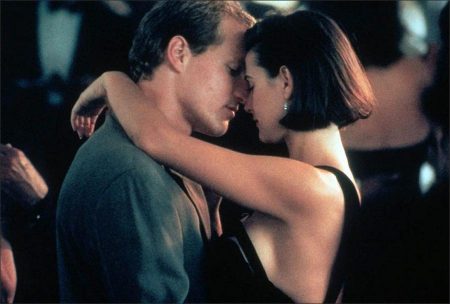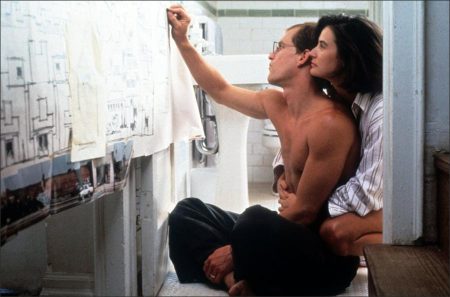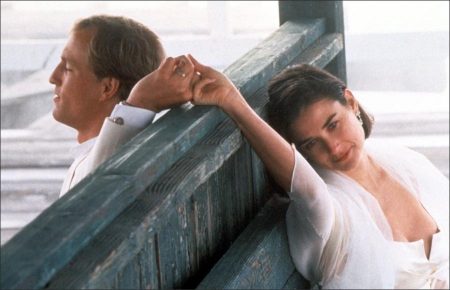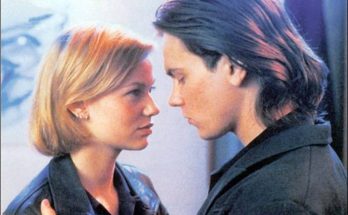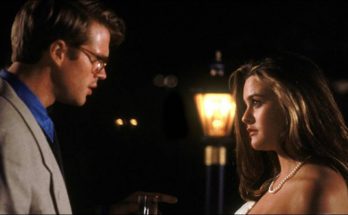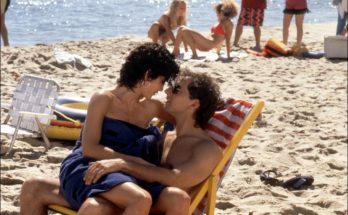Taglines: A husband. A wife. A millionaire. A proposal.
Indecent Proposal movie storyline. A happily-married young couple, David Murphy and Diana Murphy have started their respective careers, she as a real estate broker, he as an architect. She finds the perfect spot to build his dream house, and they get loans to finance it. When the recession hits, they stand to lose everything they own, so they go to Las Vegas to have one shot with their last five thousand dollars at winning the money they need.
After losing at the tables, they are approached by a suave billionaire and high-stakes gambler, John Gage, who offers them a million dollars for a night with Diana. Indignant but already seduced, Diana and David reluctantly agree. They say money can’t buy love. Though the couple agrees that this is a way out of their financial dilemma, it threatens to destroy their relationship. Can the husband and wife survive John’s ultimate test?
Indecent Proposal is a 1993 American drama film based on the novel of the same name by Jack Engelhard, in which a married couple’s relationship is put into turmoil by a stranger’s offer of a million dollars for the wife to spend the night with him. It was directed by Adrian Lyne and stars Robert Redford, Demi Moore, and Woody Harrelson. The film was a box office success, despite earning mostly negative reviews from critics, grossing nearly $267 million worldwide on a $38 million budget.
Film Review for Indecent Proposal
Maybe you’d do it and maybe you wouldn’t. Maybe you’d just like to think about it for a while. The tease behind “Indecent Proposal,” the surreally slick new daydream from Adrian Lyne, is that a lonely billionaire would offer a happily married young couple $1 million in exchange for one night’s worth of companionship from the sultry wife. Would the event mean anything? Would it change the course of true love? Have you ever bought a greeting card? Then you probably know the answer.
The first and less useful way of looking at “Indecent Proposal” is as a story so crass and farfetched that it makes no real sense. Of course it makes business sense — which is something quite different — within the context of other post-“Pretty Woman” romances about well-heeled lonely guys and sweet, innocent women who happen to be for sale.
The second and more practical view calls for grudging admiration. Working with a ridiculous premise and Amy Holden Jones’s badly underwritten script (based on Jack Engelhard’s novel), the director of “Flashdance” and “Fatal Attraction” has still come up with the sort of sexy pop parable that is his specialty. Mr. Lyne’s films may not cast any new light on the human condition, but they do keep you glued to the screen.
Mr. Lyne’s understanding of cinematic allure goes well beyond the basics, like realizing that an audience would rather watch a billionaire who looks like Robert Redford than one resembling Ross Perot. This film maker has a particular flair for warm, inviting imagery heightened by cleverly commercial touches (like the family dog looking on attentively while its owners have a heated discussion). The style itself is powerfully seductive, and part of the gamesmanship of “Indecent Proposal” is built into its glossy directorial tricks. After all, this is a film whose credits list three costume designers but only one writer. Appearances count for everything.
So the film establishes David (Woody Harrelson) and Diana Murphy (Demi Moore) as healthy, attractive characters sharing a robustly physical love affair. That’s really all it has to say about either of them. David is an idealistic architect, and Diana favors outfits that hold their own degree of architectural interest. Diana also narrates the film in fluent romance-ese: “I told myself it was over, like a dream that vanishes in the morning light. And in time — enough time — I would forget.”
What Diana wants to forget is what audiences will be expecting to remember: the paid encounter she is lured into by John Gage, a debonair gambler. Conceived as a latter-day Gatsby and played by Mr. Redford with great courtly charm, Gage turns out to be a better-than-perfect gentleman. The film carefully maneuvers the Murphys and Gage into the same Las Vegas gambling hall, lingers lovingly on Gage’s $1 million in cash and lets him recruit Diana “for luck” to help him bet. The screenplay’s paper-thin explanations for such an encounter are really part of the fun.
After this, the film allows Mr. Redford to demonstrate his talents as one of the screen’s great flirts while setting forth the title offer to the Murphys, who are conveniently in debt, for conveniently high-minded reasons. And after that — well, “Indecent Proposal” has only half of a workable premise, and nowhere to go once its cards have been put on the table.
Mr. Lyne may have the tact to leave the Diana-Gage evening to his viewers’ imaginations. But he cannot skip the sights of a tormented David, a standoffish Diana and a Gage who must now speak Diana’s dreadful language. (“I know he didn’t stop you. And if you were mine, I wouldn’t share you with anyone.”) And he cannot keep the film from spiraling down to an ending that truly defies belief.
For all its ostensible daring, “Indecent Proposal” is much too cautious. None of the three principals really change as a consequence of the story. None of the frankness that might make matters interesting is allowed to sully the romantic mood. None of the characters have lives outside the confines of the story, although the lonely Gage, when celebrating a big gambling win, suddenly gives a party for 200 anonymous, soigne-looking friends. Nowhere in this crowd is there a woman who might make this mogul’s life a little easier, with or without an astronomical fee.
“Indecent Proposal” is riddled with such lapses, and is best watched with a stronger-than-usual suspension of disbelief. So let yourself believe that Ms. Moore’s Diana might barge into a restaurant wearing hot pants and a baseball jacket, then corner her billionaire and overturn his table as a way of getting his attention. Imagine her gardening in a straw hat and flowered frock, or slipping halfway out of her T-shirt to try on an architecturally fascinating evening gown. (It begins to be clear why three costume designers were necessary.) Ms. Moore pours all of her effort into going through such motions smolderingly, and none into whatever sense may lie behind them. That’s fine for the role; she falters only when the screenplay turns mute or turns up howlers (“I took a second job teaching citizenship just to keep myself busy”).
Mr. Harrelson brings a similarly physical approach to the least credible role, radiating hunky well-being in the early scenes and indulging in door-banging, bottle-smashing, punch-throwing fits of rage later on. (This is the kind of film in which a white terry-cloth bathrobe means contentment and tousled hair indicates inner trouble.) Mr. Harrelson’s character is also made to deliver a lecture on architecture that creates grave doubts as to his professional future. Mr. Redford’s performance has a different stature, seasoned with the rueful suggestion that nothing would surprise his character, not even a movie like this one.
Mr. Lyne gets exactly the color and comic relief he wants from his supporting actors, most notably Oliver Platt as the Murphys’ astounded lawyer and Seymour Cassel as Gage’s chief henchman. (Beyond Mr. Cassel’s implacable smile, the film explains nothing about how Gage arrived at money-squandering billionaire status.) The film is also helped by Mel Bourne’s lively production design, Howard Atherton’s glamorous cinematography and especially by Joe Hutshing’s savvy, vigorous editing. Even when “Indecent Proposal” starts missing the boat in dramatic terms, it never misses a beat.
One of Mr. Lyne’s quick comic flourishes is the sight of a blond receptionist filing her nails while reading Susan Faludi’s “Backlash.” In case the director is indirectly addressing feminist critics of this film’s premise, he’s right to worry.
Indecent Proposal (1993)
Directed by: Adrian Lyne
Starring: Robert Redford, Demi Moore, Woody Harrelson, Seymour Cassel, Oliver Platt, Billy Bob Thornton, Rip Taylor, Billy Connolly, Pamela Holt, Mariclare Costello
Screenplay by: Amy Holden Jones
Production Design by: Mel Bourne
Cinematography by: Howard Atherton
Film Editing by: Joe Hutshing
Costume Design by: Beatrix Aruna Pasztor, Bernie Pollack, Bobbie Read
Set Decoration by: Etta Leff
Art Direction by: Gae S. Buckley
Music by: John Barry
MPAA Rating: R for sexuality and language.
Distributed by: Paramount Pictures
Release Date: April 7, 1993
Views: 859
